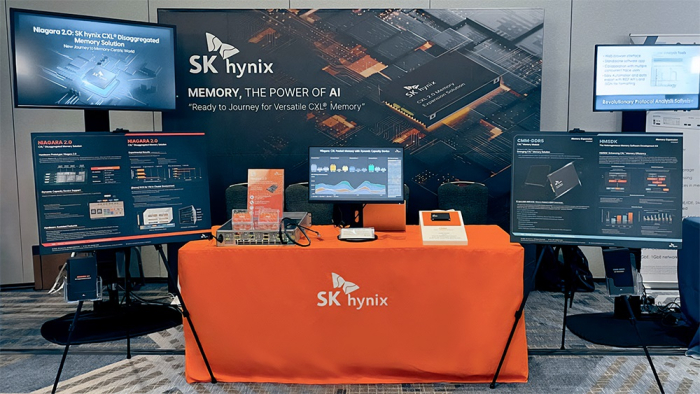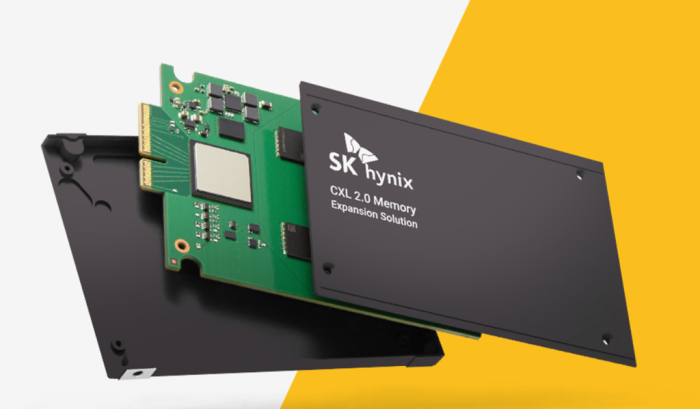Korean chipmakers
SK Hynix’s CXL optimization software tool installed on Linux
Samsung and Micron also seek to advance their CXL technologies to gain ground in the AI era
By Sep 23, 2024 (Gmt+09:00)
3
Min read
Most Read
LG Chem to sell water filter business to Glenwood PE for $692 million


KT&G eyes overseas M&A after rejecting activist fund's offer


Kyobo Life poised to buy Japan’s SBI Group-owned savings bank


StockX in merger talks with Naver’s online reseller Kream


Meritz backs half of ex-manager’s $210 mn hedge fund



SK Hynix Inc., the world’s second-largest memory chipmaker after Samsung Electronics Co., said on Monday the key features of its computer express link (CXL) optimization tool are now available on Linux, the world’s top open-source operating system.
SK Hynix said its heterogeneous memory software development kit (HMSDK) has been integrated into Linux – a significant milestone for the South Korean chipmaker that highlights its technological prowess in software.
“Developers around the world working on Linux will be able to use SK Hynix’s technology as the industry standard for CXL memory, putting us in an advantageous position for global collaboration on next-generation memory,” SK Hynix said in a statement.
Most operating systems for cloud systems and supercomputers, as well as smartphones, cars and appliances, are built on Linux.
HMSDK, SK Hynix’s software development kit, enables effective memory control, improving the performance of heterogeneous memory systems such as CXL memory.

CXL is a next-generation unified interface that adds efficiency to accelerators, DRAM and storage devices used with CPUs and GPUs in high-performance server systems.
SK Hynix said CXL is gaining attention as a next-generation AI memory technology alongside high-bandwidth memory (HBM), an AI chip of which the company is the industry’s top supplier.
MASS PRODUCTION OF CXL MEMORY BY YEAR-END
Demand for CXL memory is expected to multiply in the era of AI computing and machine learning, which require massive data processing. CXL can expand memory capacity and bandwidth well beyond current capabilities.
With CXL technology, SK said the memory capacity per server increases by more than 10 times.
“Simply put, CXL technology expands the highway linking the CPU and memory chips from two to three lanes to more than 10 lanes,” said an SK Hynix official.

The company said HMSDK enhances the memory package’s bandwidth by over 30% and improves performance by 12% over conventional systems.
Industry officials expect CXL memory to be fully commercialized by the end of this year with the planned release of server CPUs featuring the CXL 2.0 specification.
SK Hynix said it is currently validating its CXL 2.0 memory in 96 gigabyte (GB) and 128 GB capacities with its clients.
It has already collaborated with US software provider MemVerge Inc. to demonstrate its CXL-based pooled memory solution.
SK plans to begin mass production of its CXL 2.0 memory by the end of the year.
“For the development and spread of AI systems such as large language models (LLMs), it is now necessary to significantly improve not only semiconductors but also the level of system applications to support them,” said Joo Young-pyo, head of SK Hynix’s Software Solution. “With this Linux integration and collaboration, we will strive to improve our status as a total AI memory solutions provider.”

SAMSUNG RAMPS UP EFFORTS ON CXL
Other memory chipmakers are also ramping up efforts to advance their CXL technologies.
Samsung developed the industry’s first CXL-based DRAM in May 2021 and unveiled a mega-capacity 512 gigabyte (GB) CXL DRAM chip in 2022, also the world’s first.
In May 2023, the company developed a 128 GB CXL DRAM supporting CXL 2.0 technology. Earlier this year, it unveiled a CXL 2.0-supportive 256 GB CMM-D product.
In June, Samsung set up the industry’s first CXL infrastructure, certified by Red Hat Inc., a US Linux-based open-source and software developer, enabling speedy CXL product development and tailored product supply to customers.
Micron Technology Inc. unveiled its CXL 2.0 memory module in August 2023.
According to market tracker Yole Intelligence, the global CXL market is forecast to grow from $1.7 million in 2022 to $15 billion by 2028.
Write to Eui-Myung Park at uimyung@hankyung.com
In-Soo Nam edited this article.
More to Read
-
 Korean chipmakersSamsung, SK Hynix up the ante on HBM to enjoy AI memory boom
Korean chipmakersSamsung, SK Hynix up the ante on HBM to enjoy AI memory boomSep 04, 2024 (Gmt+09:00)
3 Min read -
 Korean chipmakersSamsung sets sights on next-generation memory CXL DRAM
Korean chipmakersSamsung sets sights on next-generation memory CXL DRAMJul 18, 2024 (Gmt+09:00)
2 Min read -
 Korean chipmakersSamsung Electronics builds Red Hat-certified CXL infrastructure
Korean chipmakersSamsung Electronics builds Red Hat-certified CXL infrastructureJun 25, 2024 (Gmt+09:00)
2 Min read -
 Korean chipmakersSK Hynix’s HBM chip orders fully booked; 12-layer HBM3E in Q3: CEO
Korean chipmakersSK Hynix’s HBM chip orders fully booked; 12-layer HBM3E in Q3: CEOMay 02, 2024 (Gmt+09:00)
5 Min read -
 Korean chipmakersSamsung Elec moves a step closer to CXL commercialization
Korean chipmakersSamsung Elec moves a step closer to CXL commercializationDec 27, 2023 (Gmt+09:00)
3 Min read -
 Korean chipmakersSK Hynix showcases cutting-edge CXL, AiM memory at OCP Summit
Korean chipmakersSK Hynix showcases cutting-edge CXL, AiM memory at OCP SummitOct 20, 2023 (Gmt+09:00)
2 Min read
Comment 0
LOG IN


